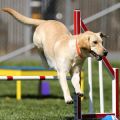The Japanese Terrier is a small and lively dog breed that originated in Japan. Known for its charming appearance and energetic personality, this breed has gained popularity not only in its home country but also around the world. With its unique characteristics and fascinating history, the Japanese Terrier has become a beloved companion for many dog enthusiasts.
The Japanese Terrier is a member of the Terrier group according to the FCI (Fédération Cynologique Internationale) typology. This group consists of various breeds that were originally bred for hunting and vermin control. The Japanese Terrier, however, stands out due to its distinct appearance and temperament.
The history of the Japanese Terrier dates back to the 17th century when it was developed by crossing native Japanese dogs with European terrier breeds brought by Dutch traders. These terriers were primarily used for hunting small game and vermin, such as rats and mice, in rural areas of Japan. Over time, the breed was refined and standardized, leading to the establishment of the Japanese Terrier we know today.
In terms of appearance, the Japanese Terrier is a small-sized dog with a well-proportioned body. It has a sleek and smooth coat that comes in predominantly white with black or tan markings. The head is slightly rounded, and the eyes are dark and expressive. The ears are small and erect, adding to the breed's alert and attentive expression. Overall, the Japanese Terrier exudes a sense of elegance and grace in its appearance.
The Japanese Terrier is primarily a companion dog and excels in this role. It is known for its friendly and affectionate nature, making it an ideal family pet. This breed forms strong bonds with its owners and thrives on human companionship. Despite its small size, the Japanese Terrier is a confident and fearless dog, always ready for adventure and play. Its lively and energetic personality makes it a great choice for active individuals or families who can provide it with regular exercise and mental stimulation.
In terms of size, the Japanese Terrier typically weighs between 5 to 9 pounds (2.3 to 4.1 kilograms) and stands at a height of around 8 to 13 inches (20 to 33 centimeters) at the shoulder. Despite its small stature, this breed possesses a sturdy and well-muscled body, allowing it to be agile and quick on its feet.
The life expectancy of the Japanese Terrier is generally around 12 to 15 years, which is relatively long compared to some other small dog breeds. This breed is generally healthy, but like any dog, it may be prone to certain health issues such as patellar luxation and allergies. Regular veterinary check-ups and a balanced diet are essential to ensure the overall well-being of the Japanese Terrier.
One interesting fact about the Japanese Terrier is its rarity outside of Japan. While it is a well-established breed in its home country, it remains relatively unknown in many parts of the world. This exclusivity adds to the appeal for those seeking a unique and distinctive companion.
In conclusion, the Japanese Terrier is a delightful and charming breed that brings joy and companionship to its owners. With its rich history, distinctive appearance, and friendly nature, it has become a beloved companion for many dog lovers. Whether in Japan or beyond, the Japanese Terrier continues to captivate hearts with its endearing personality and unwavering loyalty.

Japanese Terriers, also known as Nihon Teria or Nihon Terrier, are small-sized dogs with a big personality. Despite their diminutive stature, these dogs possess a unique character that sets them apart from other breeds. With their lively and affectionate nature, Japanese Terriers make wonderful companions for individuals and families alike.
One of the most notable traits of Japanese Terriers is their intelligence. These dogs are highly intelligent and quick learners, making them relatively easy to train. They have a natural curiosity and eagerness to please their owners, which makes training sessions enjoyable and productive. However, it is important to note that they can be stubborn at times, so consistent and patient training methods are necessary.
Japanese Terriers are known for their friendly and outgoing nature. They are social dogs that love being around people and other animals. They thrive on human companionship and can become quite attached to their owners. This breed is not recommended for those who spend long hours away from home, as they may develop separation anxiety. They are happiest when they have constant company and attention.
Despite their small size, Japanese Terriers have a lot of energy and require regular exercise to keep them physically and mentally stimulated. Daily walks, playtime, and interactive toys are essential to prevent boredom and destructive behavior. They also excel in various dog sports such as agility and obedience, which provide an excellent outlet for their energy and intelligence.
Japanese Terriers are generally good with children, but early socialization is crucial to ensure they develop a positive relationship with kids. They have a playful and gentle nature, making them suitable companions for families with well-behaved children. However, due to their small size, it is important to supervise interactions between Japanese Terriers and young children to prevent accidental injuries.
When it comes to grooming, Japanese Terriers have a short and smooth coat that requires minimal maintenance. Regular brushing to remove loose hair and occasional baths are usually sufficient to keep their coat in good condition. Additionally, their ears should be checked regularly for signs of infection, and their teeth should be brushed regularly to maintain good oral hygiene.
To raise a well-behaved Japanese Terrier, early socialization and consistent training are essential. Expose them to various environments, people, and animals from a young age to help them become confident and well-adjusted adults. Positive reinforcement techniques, such as treats and praise, work best with this breed. Harsh training methods should be avoided as they can lead to fear or aggression.
In conclusion, Japanese Terriers are intelligent, friendly, and energetic dogs that make excellent companions. They require regular exercise, socialization, and mental stimulation to thrive. With proper training and care, these dogs can bring immense joy and love to their owners' lives.
The Japanese Terrier is a small and lively breed known for its intelligence, agility, and affectionate nature. To ensure the well-being and happiness of your Japanese Terrier, it is essential to provide them with proper care and attention. Here are some tips on how to care for dogs of this breed, including what to do and what not to do:
1. Provide a Balanced Diet:
A nutritious and well-balanced diet is crucial for the overall health of your Japanese Terrier. Feed them high-quality dog food that is appropriate for their age, size, and activity level. Avoid overfeeding, as this breed is prone to obesity. Consult with your veterinarian to determine the right portion sizes and feeding schedule.
2. Regular Exercise:
Japanese Terriers are energetic dogs that require regular exercise to stay physically and mentally stimulated. Engage them in daily walks, play sessions, and interactive games. However, be cautious not to overexert them, especially during hot weather, as they are susceptible to heatstroke.
3. Grooming:
This breed has a short, smooth coat that requires minimal grooming. Brush their coat once a week to remove loose hair and keep their skin healthy. Regularly check their ears for any signs of infection or wax buildup, and clean them as needed. Trim their nails regularly to prevent discomfort or injury.
4. Socialization and Training:
Japanese Terriers are social dogs that thrive on human companionship. Early socialization is crucial to ensure they grow up to be well-adjusted and friendly. Expose them to various people, animals, and environments from a young age. Enroll them in obedience classes to provide mental stimulation and teach them basic commands.
5. Mental Stimulation:
To prevent boredom and destructive behavior, provide your Japanese Terrier with mental stimulation. Interactive toys, puzzle games, and obedience training can help keep their minds active. Engage in regular training sessions to challenge their intelligence and reinforce good behavior.
6. Regular Veterinary Check-ups:
Routine veterinary check-ups are essential to monitor your Japanese Terrier's health and catch any potential issues early on. Vaccinations, parasite prevention, dental care, and regular health examinations should be part of their healthcare routine. Consult with your veterinarian for a recommended vaccination schedule and any breed-specific health concerns.
7. Avoid Overexposure to Extreme Temperatures:
Japanese Terriers are sensitive to extreme temperatures, both hot and cold. Protect them from excessive heat by providing shade, fresh water, and avoiding strenuous activities during the hottest parts of the day. In colder weather, provide them with a warm and comfortable shelter or clothing to prevent hypothermia.
8. Avoid Harsh Training Methods:
Japanese Terriers respond best to positive reinforcement training methods. Avoid using harsh training techniques or punishment, as it can lead to fear or aggression. Instead, reward good behavior with treats, praise, and affection to build a strong bond with your dog.
9. Avoid Overprotectiveness:
While Japanese Terriers are known for their loyalty, it is essential to prevent overprotective behavior. Early socialization can help them become comfortable around strangers and other animals. Encourage positive interactions with new people and animals to prevent excessive guarding or aggression.
10. Love and Affection:
Lastly, shower your Japanese Terrier with love, attention, and affection. They thrive on human companionship and will be happiest when they feel loved and included in your family activities. Spend quality time with them, provide regular exercise, and create a safe and comfortable environment.
Remember, every dog is unique, and individual care requirements may vary. Always consult with your veterinarian for personalized advice and recommendations specific to your Japanese Terrier's needs.
The Japanese Terrier is a small and charming breed known for its distinctive coat color. These dogs typically have a predominantly white coat with patches of black or tan markings. The coloration of Japanese Terriers is often described as piebald, which refers to the irregular distribution of colors on their coat.
The base color of the Japanese Terrier is a brilliant white, which covers most of their body. This pristine white fur gives them a clean and elegant appearance. The white coat is usually smooth and glossy, adding to their overall appeal. It is worth noting that the white coloration is not only limited to the fur but also extends to their skin, giving them a unique and uniform appearance.
In addition to the white base, Japanese Terriers have patches of black or tan markings on their coat. These markings are irregularly distributed and can vary in size and shape. The black patches are usually seen around the eyes, ears, and sometimes on the back. They create a striking contrast against the white background, enhancing the dog's facial features and giving them a distinctive look.
The tan markings, on the other hand, are often found on the cheeks, eyebrows, and legs. These patches are usually lighter in color compared to the black markings and add a touch of warmth to the overall appearance of the Japanese Terrier. The combination of white, black, and tan creates a harmonious blend of colors that is both eye-catching and aesthetically pleasing.
The coat of a Japanese Terrier is typically short and smooth, which makes it easy to maintain. Regular brushing is recommended to keep their fur in good condition and to remove any loose hairs. The white coloration may require more frequent cleaning to prevent stains or discoloration, especially in areas prone to dirt or moisture.
The coloration of Japanese Terriers is not only visually appealing but also serves a practical purpose. The white coat helps them stand out in the field, making them easily visible to their owners during hunting or outdoor activities. Additionally, the black and tan markings can provide camouflage in certain environments, allowing them to blend in with their surroundings.
In conclusion, the common color of Japanese Terrier dogs is a predominantly white coat with patches of black or tan markings. This unique coloration gives them a distinctive and elegant appearance, making them easily recognizable. Whether in the show ring or as a beloved companion, the color of a Japanese Terrier's coat adds to their charm and allure.
The Japanese Terrier is a small, lively, and intelligent breed known for its affectionate nature and adaptability. When it comes to their health, Japanese Terriers are generally considered to be a robust and healthy breed. However, like all dogs, they are prone to certain health conditions. Understanding these common ailments and taking appropriate care can help ensure the well-being of your Japanese Terrier.
One of the most common health issues seen in Japanese Terriers is patellar luxation. This condition occurs when the kneecap slips out of its normal position, causing discomfort and lameness. Regular exercise, maintaining a healthy weight, and avoiding excessive jumping can help prevent this condition. If your Japanese Terrier shows signs of limping or difficulty walking, consult a veterinarian for proper diagnosis and treatment.
Another health concern in this breed is allergies. Japanese Terriers can be prone to both food and environmental allergies, which can manifest as skin irritations, itching, and gastrointestinal issues. Identifying and eliminating potential allergens from their diet or environment, such as certain proteins or pollen, can help manage these allergies. In severe cases, your veterinarian may recommend allergy testing and prescribe medication or a special diet.
Dental health is crucial for Japanese Terriers, as they are prone to dental problems like periodontal disease and tooth loss. Regular brushing of their teeth, feeding them dental-friendly treats, and providing appropriate chew toys can help maintain good oral hygiene. Additionally, scheduling regular dental check-ups with your veterinarian is essential to catch any dental issues early on.
Like many small breeds, Japanese Terriers can also suffer from Legg-Calvé-Perthes disease. This condition affects the hip joint, causing pain, lameness, and muscle atrophy. While the exact cause is unknown, it is believed to be a genetic disorder. Surgical intervention is often necessary to alleviate the pain and improve the dog's quality of life.
To ensure the overall health of your Japanese Terrier, regular veterinary check-ups are essential. Vaccinations, parasite prevention, and routine blood tests should be part of their healthcare regimen. Maintaining a balanced diet, providing regular exercise, and keeping them mentally stimulated are also crucial for their well-being.
Japanese Terriers have a short, smooth coat that requires minimal grooming. Regular brushing helps remove loose hair and keeps their coat healthy. Additionally, checking their ears regularly for signs of infection and trimming their nails as needed are important aspects of their grooming routine.
Lastly, providing a safe and loving environment is vital for the mental health of Japanese Terriers. They thrive on human companionship and require regular socialization to prevent behavioral issues. Engaging them in interactive play, providing mental stimulation through puzzle toys, and ensuring they have a comfortable and secure space to rest are all important for their overall happiness and well-being.
In conclusion, while Japanese Terriers are generally healthy dogs, they can be prone to certain health conditions. By being proactive in their care, including regular veterinary check-ups, proper grooming, and a balanced lifestyle, you can help ensure that your Japanese Terrier leads a happy and healthy life.
The Japanese Terrier is a small and lively breed known for its intelligence, agility, and friendly nature. To ensure their overall health and well-being, it is crucial to provide them with a balanced and nutritious diet. Proper nutrition plays a vital role in maintaining their energy levels, promoting healthy growth, and preventing various health issues. In this text, we will delve into the nutritional requirements of Japanese Terrier dogs, offering advice on what and how to feed them, as well as highlighting foods to avoid.
First and foremost, it is essential to provide your Japanese Terrier with a high-quality commercial dog food that is specifically formulated for small breeds. Look for a brand that uses real meat as the primary ingredient, as this will provide the necessary protein for muscle development and maintenance. Avoid foods that contain excessive fillers, artificial additives, or by-products, as these can be detrimental to your dog's health.
When selecting dog food, pay attention to the guaranteed analysis on the packaging. Japanese Terriers require a diet that consists of approximately 18-22% protein, which aids in muscle growth and repair. Additionally, the food should contain around 5-8% fat to provide them with a sufficient energy source. However, it is important to note that individual dogs may have specific dietary needs, so consulting with a veterinarian is always recommended.
In addition to commercial dog food, you can supplement your Japanese Terrier's diet with healthy and safe human foods. Cooked lean meats such as chicken, turkey, or beef can be offered in small portions as a protein-rich treat. However, it is crucial to remove any bones, skin, or seasoning that may be harmful to your dog. Steamed vegetables like carrots, green beans, and peas can also be added to their meals, providing essential vitamins and minerals.
While some human foods are safe for Japanese Terriers, there are several items that should be strictly avoided. Foods such as chocolate, grapes, raisins, onions, garlic, and avocados can be toxic to dogs and should never be given to them. Additionally, foods high in salt, sugar, or fat, such as fried or processed foods, can lead to obesity, pancreatitis, or other health issues. It is important to be aware of these potential dangers and ensure your dog's diet is free from them.
Proper portion control is crucial to prevent overfeeding and maintain a healthy weight for your Japanese Terrier. Follow the feeding guidelines provided by the dog food manufacturer, but keep in mind that individual metabolism and activity levels may require adjustments. Regularly monitor your dog's weight and body condition, and consult with your veterinarian if you notice any significant changes.
Lastly, always provide fresh and clean water for your Japanese Terrier. Hydration is essential for their overall health and aids in digestion. Ensure that the water bowl is easily accessible and refilled regularly throughout the day.
In conclusion, a well-balanced and nutritious diet is vital for the health and happiness of Japanese Terrier dogs. By providing them with high-quality commercial dog food, supplementing with safe human foods, and avoiding harmful items, you can ensure their nutritional needs are met. Remember to consult with a veterinarian for personalized advice and guidance on your dog's specific dietary requirements.





